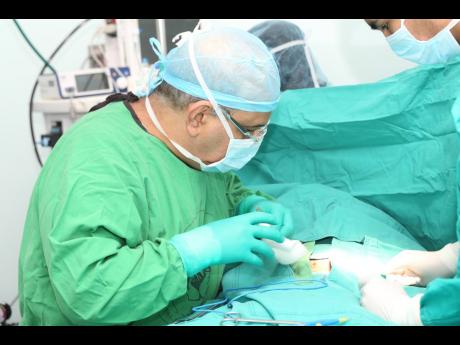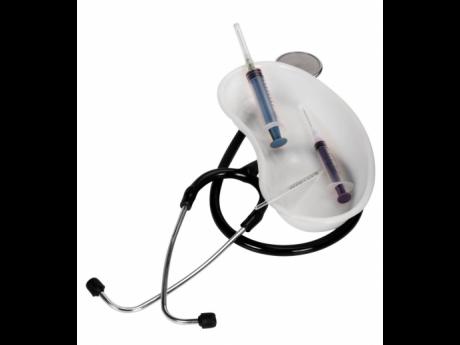‘We need a lot of kidneys’ - Plea for deceased donors as thousands seek dialysis treatment locally
Plea for deceased donors as thousands seek dialysis treatment locally
In the last five years, there have been fewer than 12 kidney transplants done in the country, but with close to 2,000 persons currently on dialysis, kidney specialists are pleading with Jamaicans to consider donating the kidneys of loved ones who have been certified brain dead.
Among those making this plea is Professor Everard Barton, chief of nephrology at The University Hospital of the West Indies and chairman of the Caribbean Institute of Nephrology.
Jamaica is currently heavily dependent on live donors, but with not many persons coming forward to voluntarily donate their kidneys to those in need, he would like to see more deceased or cadaver donor transplants being done.
“Once the person is considered brain dead, it would be good if we could have relatives who, when approached, can say, ‘I don’t mind you taking the organs’ and so on,” he told The Sunday Gleaner.
A report published recently in the journal JAMA International Medicine disclosed that the United States discards about 3,500 donated kidneys a year, although these kidneys could be used to save lives. The report was focused on the rate at which donated kidneys were used in the US and France between 2004 and 2014. During this period, the US discarded over 17 per cent of the kidneys it recovered, while France discarded a little more than nine per cent.
But Professor Barton can’t even fathom this ever being a problem in Jamaica, since available kidneys are in short supply here.
“In those countries, they have big centres where the kidneys can be stored, though it is best always to use them in less than 48 hours,” he said.
NEARLY 2,000 PEOPLE ON DIALYSIS
He explained that in cases where they have deceased donors locally, the transplant is usually done in less than 24 hours. A relative of the deceased would also need to give their consent, even if the individual had made a pledge prior to their death to have their kidney donated.
“We have to get the organs soon after the [brain dead] diagnosis is made and it has to be done by a team of people which does not involve the kidney people at all or the people doing the surgery,” Barton said, while explaining that varying tests would have to be done to certify the individual’s status.
He said pre-emptive surgeries can also be done before an individual goes on dialysis.
“We need a lot of kidneys. We have nearly 2,000 people on dialysis in Jamaica at the moment and there are others who can’t get on, especially the young people and the children. We would love if we could get kidneys to transplant them,” he said.
“We know that there are some who will have to stay on dialysis for the rest of their lives because they have multiple adverse factors which would prevent major surgery, but you have many others who can benefit from kidney transplant,” said Professor Barton.
Jamaica needs a deceased kidney donor programme
Founder of Jamaica Kidney Kids Foundation, Dr Maolynne Miller, shared that there are eight children between the ages of four and 16 years old who are currently on dialysis. Given the dire need for kidneys, the paediatric nephrologist would also like to see more deceased kidney donations being done.
“All those people, the motorcyclists who die in Westmoreland, these are otherwise healthy young men. If we had a cadaver [deceased] donor programme, we would have kidneys to stone dogs, but there is no such programme,” she said.
Specialists in the field have been calling for a donor registry to be established, but more important than this is the need for public education aimed at getting persons to donate their relatives’ organs.
“Somebody just needs to pick it up and move with it. Legislation is there, it just needs to be updated, and it takes somebody who wants to take on this as a project to see it through,” Miller told The Sunday Gleaner.
According to Professor Everard Barton, chief of nephrology at The University Hospital of the West Indies and chairman of the Caribbean Institute of Nephrology, Professor Lawson Douglas used to organise walks in the 1990s to talk about kidney disease and donation.
Professor Douglas was regarded as a leading expert on kidney transplant and disease treatment in the Caribbean. Professor Barton recalled how they used to walk 25 killometres every Saturday and were assisted by one of the social clubs in distributing donor cards to persons who wished for their kidneys to be donated when they die.
“We also had a lot of people who had relatives who had kidney disease who said they wished to be live donors. I think we need to step up the education programme again, so that we could highlight these things,” Barton said.




